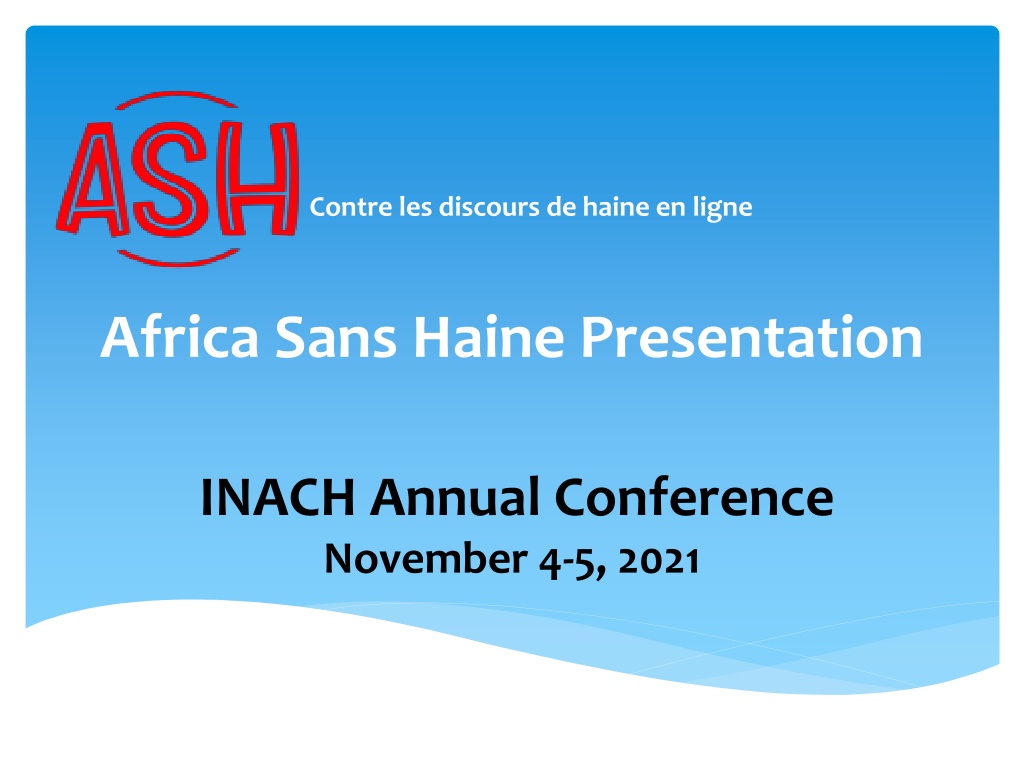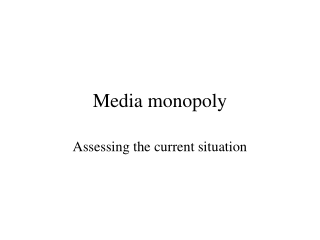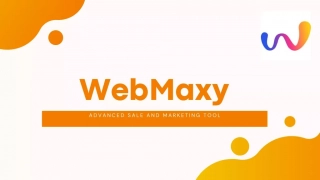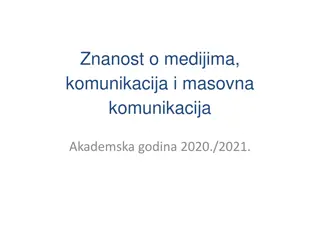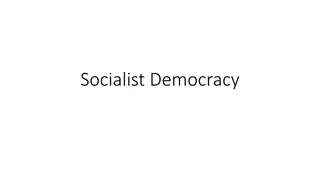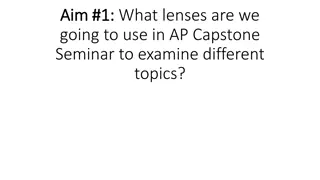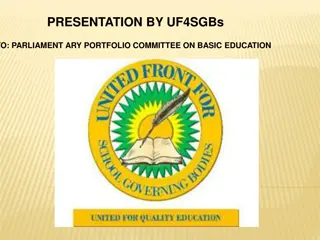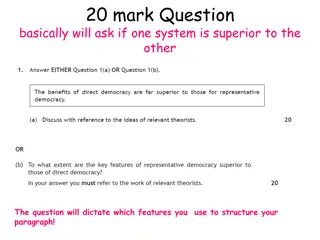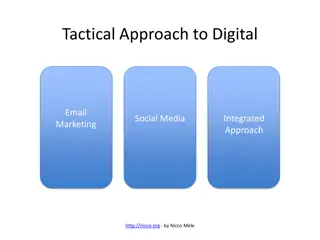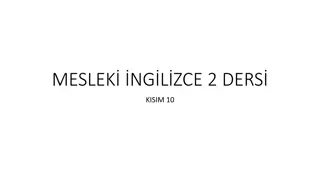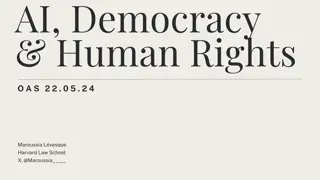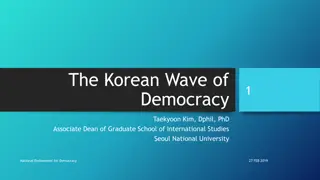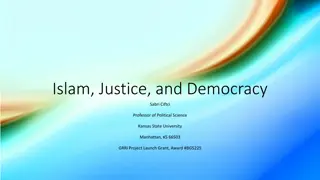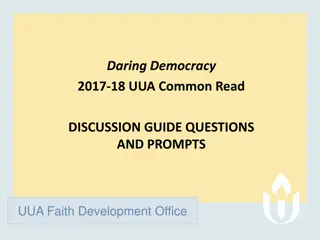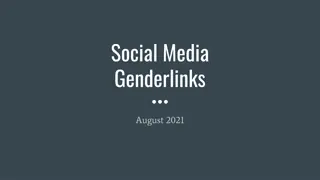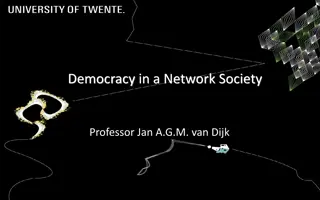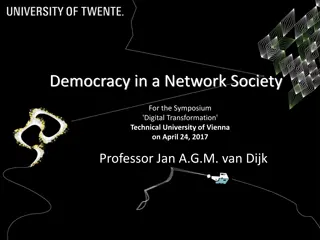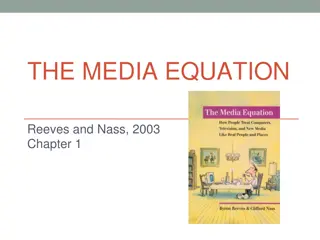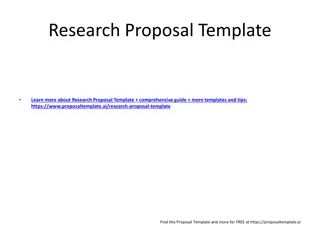The Complex Relationship Between Social Media and Democracy in Africa
The turbulent dynamics between social media and democracy in Africa are explored in this content, shedding light on the challenges posed by hate speech, fake news, and misinformation. With a significant portion of the African population using the internet and engaging in social media, the impact on democratic processes is substantial. This analysis delves into the figures and statistics surrounding social media usage in Africa, emphasizing the need to address the tensions between online expression and governmental structures.
Uploaded on Sep 20, 2024 | 0 Views
Download Presentation

Please find below an Image/Link to download the presentation.
The content on the website is provided AS IS for your information and personal use only. It may not be sold, licensed, or shared on other websites without obtaining consent from the author. Download presentation by click this link. If you encounter any issues during the download, it is possible that the publisher has removed the file from their server.
E N D
Presentation Transcript
Contre les discours de haine en ligne Africa Sans Haine Presentation INACH Annual Conference November 4-5, 2021
Theme: Social media, helping or hindering democracy in Africa ?
In democracy and social media are still tense. Africa, relations between The behaviors of one and the other are hardly compatible. They live at loggerheads.
Social media in Africa mean excessive freedom of expression, sanctioned by hate speech, fake news, disinformation ... On the other hand, African democracy is made up of coups, bad elections, constitutional violations and dictatorship.
This image shows the tumultuous relationship between social media and democracy in Africa
Here are some figures to understand social media in Africa
According to statistics of October 26, 2021, Africa has a population of 1,387,012,900. 46% of the African population uses the Internet, or 634,863,000 people (statistics March 2021).
Internet users in Africa around the world (statistics for July 2021) REGIONS NUMBER OF USERS IN PERCENTAGE ASIA 50,3 % EUROPE 15,9% AFRICA 11,5% LATIN AMERICA /CARIBBEAN 10,1% NORTH AMERICA 7,6%
African social media users 277,200,000 Africans use social media. NB: The figures vary slightly according to the sources and the dates of their publication.
Social media in vogue in Africa are: - Facebook - YouTube - WhatsApp - Linkedin - Instagram - Twitter - Tik-Tok.
Facebook Facebook is the most used social media in Africa. It has 206,161,000 subscribers, or 17% of the African population (2018 stats).
In which social media is there a lot of hate speech? The majority of hate speech in Africa is shared on Facebook. There is a lot of hate speech on Facebook because it is the social media of ordinary people: ordinary citizens, poor citizens, illiterate people, etc.
On Facebook, there are profiles, groups and pages, some thousands of members. with hundreds of Almost all of these groups and pages do not have community managers to ensure moderation. Members whatever they want. are sharing
Linkedin You hardly ever come across hate speech on Linkedin in Africa This is because Linkedin is a professional network where people publish only on innovations, jobs, companies, startups, opportunities, professional networks ...
Instagram Hate speech is also lower on Instagram in Africa, except in some videos. Africans tend to use Instagram as a photo album and not as a social chat network. Their best photos, they post them on Instagram
What age groups are using social media in Africa? The majority of those who use social media (especially Facebook) in Africa are people aged 25 to 34.
Social media users by age in Africa AGE GROUPS PERCENTAGE 25 34 ans 35% 18 - 24 ans 33% 35 44 ans 13% 45 et plus 11%
Who publishes hate speech in Africa? 1. Young people are the biggest propagators of hate speech Politicians 3. Community, religious and opinion leaders 4. Traditional media 5. You Tube channels 6. Live Facebook 2.
Which sex shares the most hate speech in Africa? Men 97 % Women 3%
What types of hate speech are very common in Africa? - Incitement to ethnic hatred - Insults - Incitement to murders - Xenophobia - Anti-white or anti-black racism - Animalization - Sexist words - Apology for crimes - Sextapes shared to destroy reputation ...
The mouth is also a social media that spreads hatred. We must close it
What are the sources of hate speech in Africa? 1. Politics, elections, appointments to government, to public institutions, etc. 2. The supposed superiority of one ethnic group over others or tribalism 3. Exclusion, marginalization, discrimination 4. Land disputes between rival ethnic groups. In fact, a lot of hate speech revolves around politics and ethnic identities.
Anti-Semitism also exists in Africa In countries like South Africa, it is not uncommon to hear things like, Down with Israel! "Cases of aggression against Jews as well. Some Africans of Jewish origin are the subject of hate messages. There are some who are called "brothers Iscariot", and so on. of Judas
Do African women play a role in the dissemination of hatred on social media?
Generally speaking, African women are very reserved. Rather, it is men who disseminate 97% of hate speech online. Women just like or comment.
According to our study, the subjects on which African women react quickly on the social media are: - Women's rights, - Beauty, - Fashion, - Entrepreneurship, romantic relationships, etc.
In the DRC, for example, women are less present on social media than men. We noticed that, the African woman spreads hatred and fake news less than men.
Estimates of women connected to social media in the DRC Women 35 % Men 65 %
Hate speech from Africans in the diaspora (USA, Europe) Congolese, Guineans, Chadians, etc., living in Europe or the United States, make live Facebook every week where they insult and attack ethnic groups and personalities from their countries of origin. Their videos are shared on their YouTube channels very popular in Africa. Cameroonians, Ivorians,
These Africans in the diaspora are taking advantage freedom of expression in Europe to abuse. This is because they know that in the West they are safe from legal action by their countries of origin. of the strong
This guy is a Congolese based in Belgium. On You Tube, he insults his compatriots
What NGOs do research on hate speech in Africa? About research, to our knowledge, to date, only Africa Sans Haine and Internews C te d'Ivoire do research on hate speech in Africa on an ongoing basis. With monitoring reports every week or every month. Other NGOs do this, but rarely.
Africa Sans Haine C te d Ivoire
The challenges of fighting hate speech in Africa 1. African states, the media and NGOs do not take the issue of hate speech seriously in Africa; 2. Despite several reports, Facebook, Twitter and other social networks rarely remove reported hate messages. It stays on their platforms for weeks or even months and people keep sharing;
On Facebook, for example, some groups and pages contain only hateful content; In addition, hate speech outnumber Fake News on Facebook
Fake News vs Hate speech 40% Haine Fake News 60%
In several African countries, there are no specific laws against hate speech. That is why it is difficult to repress the authors of such speeches; The perpetrators of hate speech are sometimes protected because they belong to the party in power, to the ethnic group of such and such authority ... This encourages impunity.
Our needs - Strengthen the capacities of NGOs in the fight against hate speech; - Support these NGOs; - Organize awareness campaigns for young people online and offline - Etc.
Are social media helping democracy or destroying it in Africa?
For us, the answer to this question is 50-50 Yes, social media are very important to protect democracy in Africa. Almost all of African countries have instituted policies that severely restrict public freedoms, especially freedom of expression.
Peaceful demonstrations are still repressed in Africa. State radios and televisions belong only to officials: president, ministers, MP, etc. Opinions are oriented in the sense of flattering the regime in place. So, social media are therefore an excellent alternative for Africans to freely express their opinions on the way their countries are managed. They denounce what is wrong and it is very good for democracy.
In contrast, social media undermines democracy because it has become the bastion of fake news, disinformation and hate speech. They have become a privileged ground for insults, racism, xenophobia, incitement to violence, murders ...
And this is where INACH and its member organizations have their role to play to moralize social media and protect democracy.
Thank you Jean-Hubert Bondo Africa Sans Haine Democratic Republic of the Congo
